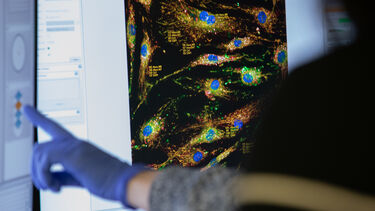- Preclinical results show a new neuroprotective medicine which 'switches on' cell defenses, could significantly slow disease progression
- Researchers at the University of Sheffield’s Institute for Translational Neuroscience (SITraN) discovered M102 has powerful protective effects on the nerve cells that are damaged in MND
- In studies of MND mouse models, M102 improved movement, gait and motor neuron health and in cell models derived from MND patients motor neuron protection was also achieved
- The research predicted safe and effective dose ranges for humans, paving the way for clinical trials
A groundbreaking drug candidate found to protect nerve cells damaged by motor neuron disease (MND), could offer new hope to people living with this devastating condition.
Researchers at the University of Sheffield’s Institute for Translational Neuroscience (SITraN) discovered and developed M102, a new medicine that has powerful protective effects on the nerve cells that are damaged by the neurodegenerative disease that currently has no cure.
In preclinical studies, M102 slowed disease progression and preserved muscle function in mice with MND improving movement, gait, and nerve function.
Importantly it also protected motor neurons grown in the laboratory from damage caused by MND patient cells known as astrocytes. These are cells in the nervous system which normally support and protect motor neurons. The findings, published in the journal Molecular Neurodegeneration, suggest M102 could significantly extend length and quality of life for people living with MND.
Motor Neuron Disease (MND), also known as amyotrophic lateral sclerosis (ALS), is a progressive and life-shortening condition that affects the nerve cells in the brain and spinal cord that control movement (motor neurons). MND causes the motor neurons to gradually stop sending messages to muscles, leading to progressive muscle weakness, muscle wasting, and stiffness. This can affect a person's ability to walk, talk, swallow, and breathe. Most people with MND die within two to five years from the onset of symptoms.
Professor Dame Pamela Shaw, Director of SITraN and lead investigator of the study, said: “MND is one of the cruellest diseases, robbing people of their mobility and independence often at an alarming speed. We are now at a point where scientific understanding is finally catching up. Our discovery of M102 gives real hope that we can substantially slow the progression of this disease.
“The preclinical studies not only showed improvement in movement, gait, and nerve function in mouse models, but it also protected motor neurons grown in the laboratory from damage caused by MND patient cells.”
Unlike most current treatments that focus on a single biological pathway, M102 works in a dual-action, activating two major protective systems inside cells — called NRF2 and HSF1. Together, these systems help nerve cells combat stress, reduce inflammation, improve energy generation and clear away damaged proteins — all of which are known to contribute to motor neuron injury in MND.
The groundbreaking research is a collaboration between the University of Sheffield and Aclipse Therapeutics, a biotech company based in the United States.
Dr Richard Mead, Senior Lecturer in Translational Neuroscience at SITraN and lead co-author of the study, said: “Turning scientific discovery into real treatments takes teamwork — bringing together researchers, clinicians, industry partners, and investors. Our collaboration with Aclipse Therapeutics has built that essential bridge between the research laboratory and the clinic. We’re now ready to take the next crucial step: testing M102 in people with MND and moving closer to a treatment that can truly make a difference.”
The Sheffield research team has confirmed M102's safety and ability to protect motor neurons in animal models. The next steps are to enter clinical trials in humans once funding has been secured.



